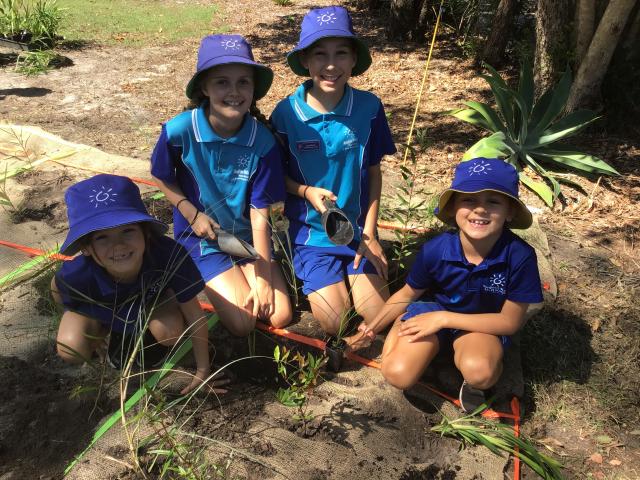In a joint initiative between Noosa Landcare and the generosity of the Swanepoel family, Sunshine Beach State School has continued its annual Pocket Forest planting program. This special initiative fosters connection to nature and to each other with Years 1 and 6 students joining together to plant over 200 native trees indigenous to the Sunshine Beach area.
The Pocket Forest is designed using the Miyawaki method and utilises native trees from the pre-clearing eco system and remnant eco system. Plants are strategically planted in a dense arrangement intentionally to create its own sustainable eco system. This year’s Pocket Forest project was enhanced by the active composting program that the students of the school have embraced, aiming to reduce the amount of compostable rubbish ending up in landfill.
Gary Swanepoel explained, ‘The trees planted by this companion method grow much faster and require little maintenance. It’s an ideal self-maintained project for creating diverse forests quickly. I wanted to pay it forward and provide the students with a sense of ownership for creating a healthier planet. I’m hoping in the future, these students will look back fondly and say ‘I planted that tree.’ Next year we will scale up reducing the school’s food waste into compost for the next plot and start to focus on food-producing native plants alongside native bee hives.’
Along with Gary, Sarah Lawson from Noosa Landcare imparted much knowledge while they supervised the students planting the many trees, bushes and grasses. Specially selected flora, such as dianella caerulea to attract frogs, corymbia intermedia (commonly known as pink bloodwood, a favourite of koalas), and banksia integrifolia (commonly known as the coast banksia, attracting black cockatoos), was included. A specially designed structure was included for Richmond birdwing butterfly vines to grow. The Richmond Birdwing butterfly is one of Australia’s largest butterflies and one of the most in need of protection. Listed as vulnerable under the Nature Conservation Act, it is a critical priority species. Sunshine Beach State School is fortunate enough to be one of the few population pockets remaining in southeast Queensland and northern New South Wales.
Within the context of the current climate change emergency and stark warnings about the global loss of biodiversity, being able to create diverse, healthy forests quickly could prove vital to meeting international targets and tackling these issues. Principal Alison Welch stated, ‘We are very grateful to have partnered with Gary and Noosa Landcare to develop this initiative, and extremely appreciative of the generosity of the Swanepoel family. As one of the core values, Sunshine Beach State School endeavours to nurture environmentally responsible students and involvement in projects like the pocket forest is a testament to the school’s commitment to achieve this.









